The increase of online colleges in North Dakota has made it not only the land of vast prairie land but also a land of vast possibilities for many.

The state has top-notch colleges and universities, many of which offer online learning programs and some of the lowest tuition rates in the country.
Editorial Listing ShortCode:
If you’re thinking about pursuing a postsecondary degree in North Dakota, you can read on to check out what may be in store for you.
Online Colleges in North Dakota

According to data for the National Center for Education Statistics (NCES), many students are taking advantage of the state’s online colleges and programs.
Nearly 30% of North Dakota’s higher education students are enrolled in fully online degree programs, and an additional 33% of students are participating in a hybrid of online and on-campus classes.
Today, most of North Dakota’s public and private institutions offer fully online learning opportunities. Some offer more than 120 fully online programs, including certifications and undergraduate and graduate degrees.
Many North Dakota universities and colleges online can be attended entirely through self-paced online courses or a combination of semester-based courses.
Editorial Listing ShortCode:
Several private institutions throughout the state also offer fully online bachelor’s degrees in the business and communications fields and online master’s programs in areas like leadership, education, and science.
Common Online Degrees in North Dakota

North Dakota online colleges offer a broad range of majors. These are five of the most popular degrees in the state and what they typically entail:
- Accounting: This major can help prepare you to provide financial leadership. Graduates often pursue careers as budget analysts, accountants, or finance managers.
- Business Administration: This degree can help you hone your business and interpersonal skills. Coursework typically includes accounting, economics, marketing, and organizational psychology.
- Computer Science: This degree covers computational theories and methods to build, code, and repair technology. Common topics of study include programming languages, computer architecture, and software engineering.
- Elementary Education and Teaching: This degree is typically taken in preparation to teach kindergarten through 5th grade. Common topics of study include child development and teaching strategies.
- General Studies: This flexible degree can allow you to take courses in various disciplines, ranging from the arts to political science.
If you haven’t chosen a major yet, researching these common degrees may be a helpful starting place.
Overview of Higher Education in North Dakota

North Dakota is home to 20 degree-granting institutions, according to the NCES. Of these, 14 are public institutions, 5 are non-profit private schools, and just 1 is a for-profit private school. This includes community colleges in North Dakota.
The NCES reports that the average tuition for a 4 year public institution in North Dakota is $9,065 a year for in-state students and $13,501 for out-of-state students.
Students in the western states may be able to get a discount, thanks to North Dakota’s partnership with the Western Interstate Commission for Higher Education (WICHE).
WICHE’s Student Exchange Program allows qualifying students to enroll in degree programs at any of the 16 participating states and territories for no more than 150% of the in-state tuition rate.
Employment Outlook for College Graduates in North Dakota

North Dakota has one of the smallest economies in the United States. According to the Bureau of Economic Analysis (BEA), the state has one of the lowest increases in gross domestic product.
Despite this, North Dakota still has job openings for college graduates. Data from the Bureau of Labor Statistics (BLS) shows that the state had a 2.1% unemployment rate, which is lower than the national rate.
According to the BLS, the industries experiencing the fastest job growth in North Dakota include:
- Mining and logging
- Professional and business service
- Leisure and hospitality
- Manufacturing
- Education and health services
These industries may offer more plentiful job opportunities for college graduates than other sectors.
Careers & Salaries in North Dakota
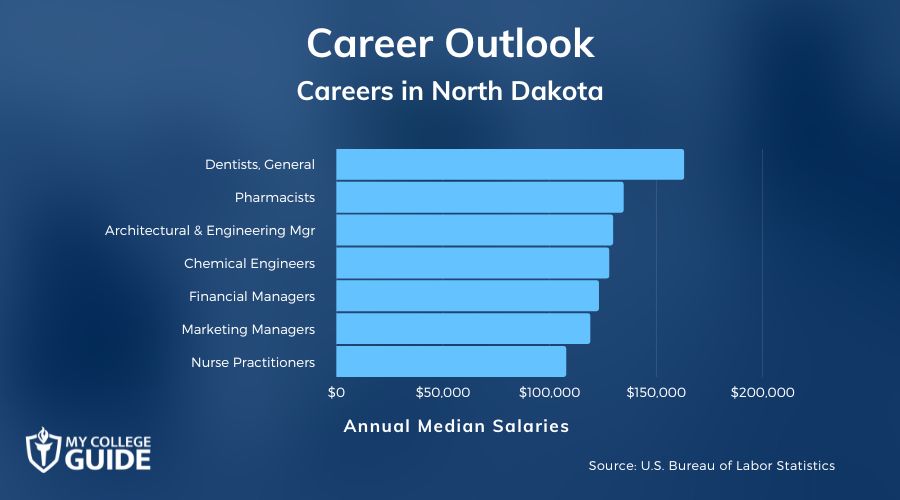
North Dakota online degrees can prepare graduates for careers in many industries. According to North Dakota’s Labor Market Information Center, these occupational groups are projected to have high growth over the next 10 years:
- Construction and extraction
- Food preparation and service related
- Transportation and materials moving
- Healthcare practitioners and technical
- Installation, maintenance, and repair
Other sectors in North Dakota projected to experience job growth in the next few years include architecture, business, and engineering. If you want to enter an industry with a positive employment outlook, you may want to consider completing an online degree related to one of these areas.
Editorial Listing ShortCode:
Based on data from the Bureau of Labor Statistics, here are ten careers related to these growing sectors and their median wages in North Dakota.
| Careers | Annual Median Salaries |
| Dentists, General | $162,950 |
| Pharmacists | $134,620 |
| Architectural and Engineering Managers | $129,670 |
| Chemical Engineers | $127,840 |
| Financial Managers | $123,030 |
| Marketing Managers | $118,960 |
| Nurse Practitioners | $107,680 |
| Industrial Production Managers | $104,980 |
| Petroleum Engineers | $103,130 |
| Veterinarians | $101,710 |
Graduates may enter several of these careers immediately after completing an online bachelor’s degree. For example, chemical engineers and petroleum engineers are typically considered entry-level positions. Other professionals, like pharmacists and veterinarians, must earn graduate-level degrees.
Online North Dakota Colleges Admissions Requirements

Admissions procedures and requirements differ between ND online colleges, but these are a few common requirements for undergraduate admissions:
- ACT or SAT scores: Only some schools require applicants to submit standardized exam scores.
- College essay: You may need to write a paper about your career goals and interests.
- High school and college transcripts: These official records display your GPA and the classes you’ve taken.
- Resume: This one-page document provides your educational history, work experience, extracurricular activities, and applicable skills.
Most programs list their admissions criteria on their websites. You may also contact each school’s admissions office for more information.
ND Colleges Online Accreditation
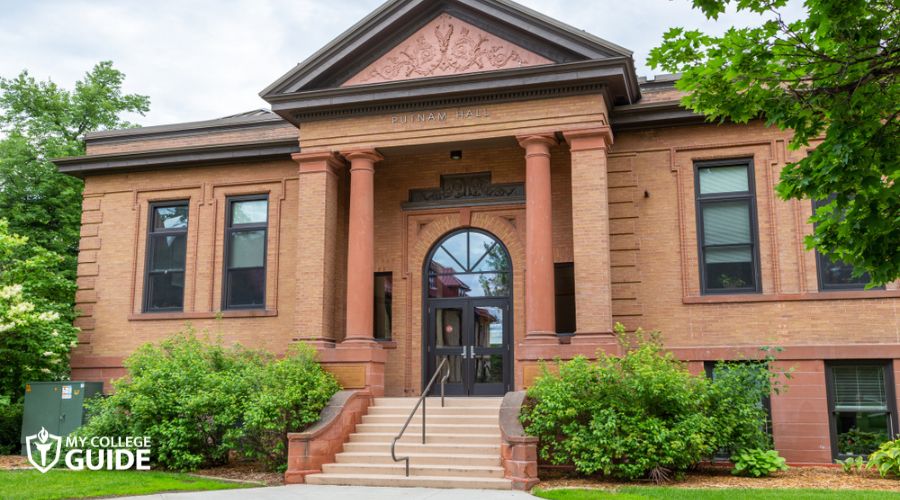
Regional accreditation is one factor to consider as you investigate North Dakota online degrees.
Higher education institutions can receive accreditation if they prove that they meet strict educational standards. For example, accredited schools may offer specific courses, have low student-to-faculty ratios, or provide student support services.
Regionally accredited schools typically have more prestige than non-accredited institutions because they have demonstrated that they provide a high-quality education.
Earning a degree from an accredited program could potentially unlock new career paths and networking opportunities. Plus, many professional organizations limit membership to people with accredited degrees.
Financial Aid and Scholarships
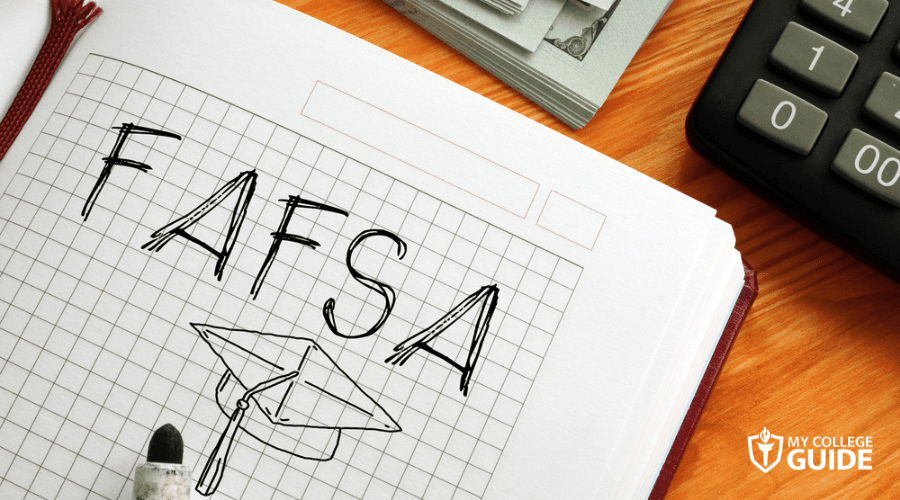
If you’re thinking about pursuing a degree at one of the online colleges in ND, the first thing you may consider doing is filling out the Free Application for Federal Student Aid (FAFSA). This application can be used to determine your access to federal, state, and even some forms of private financial aid.
College students in the state of North Dakota can apply to the following programs as well:
- North Dakota State Grant Program: This program is for first-time undergraduate students. It provides up to $1,100 per semester or $733 per quarter.
- North Dakota Academic Scholarship: High school seniors with GPAs of 3.0 or higher and ACT scores of 24 or higher may apply for this scholarship. It awards $750 per semester for a total of up to $6,000.
- North Dakota Career & Technical Education Scholarship: High school seniors with GPAs of 3.0 or higher and ACT scores of 24 or higher may apply for this scholarship. It awards $750 per semester for up to $6,000.
- North Dakota Indian Scholarships: Applicants for these scholarships must be enrolled members of a federally recognized Indian tribe. The merit-based scholarships require GPAs of 3.5 or higher. The need-based scholarships require GPAs of 2.0 or higher. They award up to $2,000 per year.
- North Dakota Scholars Program: This program covers the full undergraduate tuition of those who are chosen. High school seniors who score in the 95th percentile on the ACT by the yearly deadline may apply.
The state also offers tuition and fee waivers for qualifying law enforcement officers, national guard members, dependents of veterans who were killed or disabled, and senior citizens.
Editorial Listing ShortCode:
North Dakotans can also find privately funded scholarship programs, which award funds for need and merit, as well as unique factors like the region you live in, particular hobbies or talents you have, or the course of study you’ve chosen.
Here are some scholarships open to residents of North Dakota:
- Greater Midwest Chapter of Professional Convention Management Association (PCMA) Scholarship: $5,000
- Jack Shelley Scholarship: $1,250
- Marathon Petroleum Youth Leadership Awards: $2,500
- Victor & Verna Johnson Scholarship: Multiple awards
You can also check with the financial aid office at the college or university you have chosen. They may have information about assistance that is unique to the school.
North Dakota Online Education Resources

Several online resources offer free support for students interested in North Dakota online degrees, including:
- Advancing Students Toward Education and Employment Program (ASTEP): This three-year program helps students with developmental or intellectual disabilities transition to college and gain independence.
- Bank of North Dakota: This website has a student loan debt calculator, financial education materials, and information about salaries in North Dakota.
- North Dakota University System: This government organization oversees colleges in North Dakota and directs students to financial aid resources in the state.
These resources can help you gather information about ND online colleges and how to pay for them so you can choose the right one for you.
How Much Does It Cost to Go to an Online College in North Dakota?

Costs can vary widely between North Dakota online colleges. Your residency and the school’s funding source are two factors that affect tuition and fees. Typically, out-of-state students and private college students pay the most.
Based on data from the National Center for Education Statistics, here are the average tuition costs to attend colleges in North Dakota for one year:
- Public 4 year college for in-state students: $9,065
- Public 4 year college for out-of-state students: $13,501
- Private 4 year college: $16,408
- Public 2 year college for in-state students: $5,233
It’s beneficial to research each school’s tuition costs before applying.
Tuition Breaks for Out-of-State Students

Out-of-state students from Minnesota may qualify for tuition discounts at ND online colleges through the Minnesota-North Dakota Tuition Reciprocity Program. This initiative allows North Dakota residents to attend public colleges in Minnesota and vice versa.
Under the reciprocity agreement, Minnesota students pay slightly higher tuition while attending North Dakota colleges. By contrast, North Dakota residents pay in-state tuition prices at Minnesota colleges.
Editorial Listing ShortCode:
The reciprocity program has some restrictions. For example, several professional programs don’t allow reciprocity students. Also, students don’t qualify for the reciprocity program if they attend a private school that charges all students the same tuition price.
If you’re a Minnesota resident interested in ND online colleges, it’s beneficial to contact the financial aid offices at programs of interest before you apply. The staff can verify your eligibility for tuition reciprocity at their institution.
What Jobs Are in High Demand in North Dakota?

North Dakota has several occupations in exceptionally high demand. According to the Bureau of Labor Statistics, the following careers have some of the highest employment rates in the state:
- Registered nurses
- General and operations managers
- Nursing assistants
- Home health and personal care aids
- Accountants and auditors
North Dakota residents interested in pursuing jobs in high demand may consider one of these roles. Many popular occupations, like accountants and registered nurses, require a bachelor’s degree. Others, like nursing assistants, may only require an associate degree or certificate to get started.
What Are the Highest Paying Jobs in North Dakota?
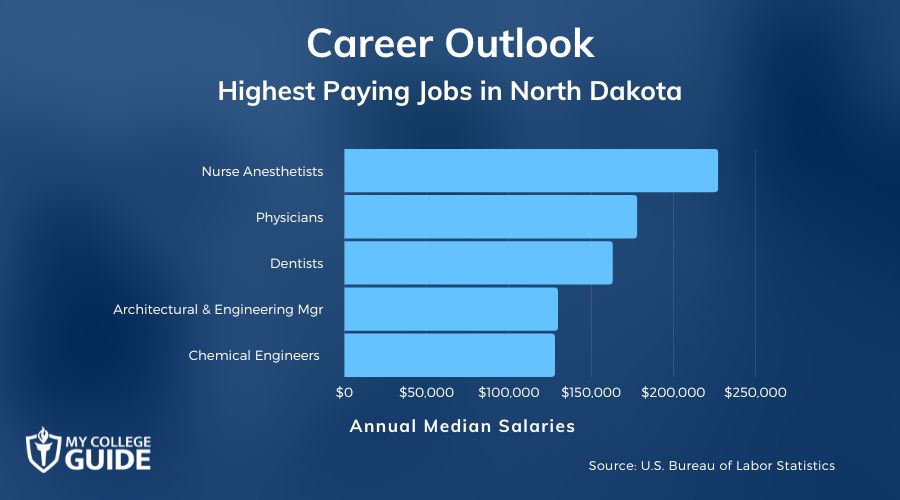
Graduates from North Dakota online colleges may unlock lucrative career opportunities. Based on data from the Bureau of Labor Statistics, the following are some of the highest-paying careers in North Dakota:
- Nurse anesthetists: $227,010
- Physicians: $177,760
- Dentists: $162,950
- Architectural and engineering managers: $129,670
- Chemical engineers: $127,840
Many factors impact job availability, salary, and benefits. For example, some regions may have more job openings for a particular career than others. A willingness to relocate, graduate degrees, and networking may increase your earning potential.
List of Online Colleges in North Dakota
Methodology: The following school list is in alphabetical order. To be included, a college or university must be regionally accredited and offer degree programs online or in a hybrid format.

Bismarck State College offers a Bachelor of Applied Science in Cybersecurity and Information Technology and a Bachelor of Applied Science in Energy Management online.
The college also offers a wide array of certificate and associate degree programs in applied science that are housed fully online. Potential topics of study include business administration, criminal justice, pre-medicine, and computer science.
Bismarck State College is accredited by the Higher Learning Commission.

Dickinson State University offers several 100% online degree programs for students who prefer a distance learning format.
Some programs utilize synchronous classes, while others allow students to complete coursework asynchronously. Students can select from diverse certificate, baccalaureate, and master’s programs through DSU online. Disciplines offered include education, business administration, healthcare, and hospitality.
Dickinson State University is accredited by the Higher Learning Commission.

Students needing the flexibility of distance learning may find an ideal fit in Mayville State University. Mayville offers undergraduate and graduate certificate, associate, bachelor’s, and master’s programs that meet entirely online.
Students may complete coursework asynchronously or synchronously in virtual classrooms. Many programs allow part-time and full-time attendance.
Mayville State University is accredited by the Higher Learning Commission.

Minot State University offers undergraduate and graduate degrees online. This learning format is designed to help even the busiest students take the next step in their education.
Potential programs for online students include bachelor’s degrees in marketing, early childhood education, and criminal justice. Master’s degrees are available in disciplines like speech-language pathology, education, and information systems.
Minot State University is accredited by the Higher Learning Commission.

North Dakota State University offers bachelor’s and master’s degrees in a convenient distance learning format.
NDSU offers degrees online in subjects like business administration, economics, human development and family science, nursing, or marketing. Other programs may offer a blend of online and in-person course delivery.
North Dakota State University is accredited by the Higher Learning Commission.

Rasmussen University—Fargo offers over 50 graduate and undergraduate certificate and degree programs that can be completed 100% online.
Students can select from a wide variety of subjects within the Schools of Business, Technology, Justice, Nursing, or Health Sciences. Even students attending fully online programs have access to additional resources and support at the university’s Fargo campus.
Rasmussen University – Fargo is accredited by the Higher Learning Commission.

The University of Jamestown keeps busy students in mind by offering diverse bachelor’s and graduate degree programs via a convenient online model. Potential fields of study offered include behavioral health, business, communications, clinical research, and nursing.
Most programs utilize an accelerated, 8 week course format that meets year-round, potentially allowing students to finish their requirements faster.
The University of Jamestown is accredited by the Higher Learning Commission.

The University of Mary has over 50 online and flexible evening programs for undergraduate and graduate students who are unable to attend courses with a traditional in-person schedule.
Programs are available in disciplines like business, behavioral science, art and humanities, health sciences, education, and Catholic professional studies.
The University of Mary is accredited by the Higher Learning Commission of the North Central Association of Colleges and Schools.
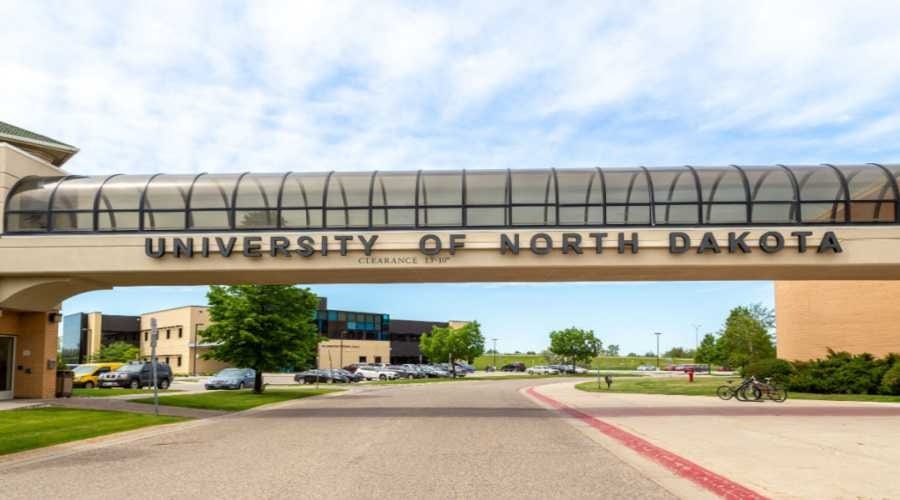
At the University of North Dakota, a variety of courses, degree programs, and continuing education opportunities are offered 100% online. Online classes either utilize an asynchronous, self-paced format or a semester-based virtual attendance model.
Degrees are available in education, business, engineering, aviation, accounting, American Indian studies, machine learning, behavioral studies, and more.
The University of North Dakota is accredited by the Higher Learning Commission.

Valley City State University’s online degree programs offer digital accessibility and flexible learning. This format is designed to allow students to complete their requirements at their own pace from the convenience of their own home.
VCSU offers online graduate and undergraduate programs in disciplines like information systems, English, education, business, music, or social sciences.
Valley City State University is accredited by the Higher Learning Commission of the North Central Association of Colleges and Schools.
Getting Your Online Degree in North Dakota

North Dakota takes pride in providing a first-rate higher education system. With many well-respected colleges and universities, plenty of online education programs, and generous financial aid programs, North Dakota is an excellent place to earn a postsecondary degree for many.
When you’re ready to take the next step in your journey, you may consider researching accredited online schools in North Dakota that offer your chosen degree program.
You can also view our Online Colleges in North Carolina and Online Colleges in Ohio guides for more options.
